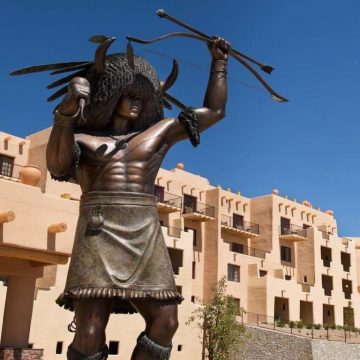
The Pueblo of Pojoaque Tribe of New Mexico agreed to a new gambling compact with the state this week. The tribe, which owns Buffalo Thunder Casino near Santa Fe, has been in a dispute with the government since June 2015.
Under terms of the new compact, the tribe will pay a tax rate of 10.5% on its gaming revenues moving forward. The tax rate on the tribe’s three casinos under the previous deal had been 8%.
Pueblo of Pojoaque’s Gaming Taxes
The previous Indian gaming compact expired in June 2015, but the administration of Gov. Susana Martinez and the Pueblo of Pojoaque’s leadership could not agree on a tax rate. The federal Indian Gambling Regulatory Act of 1988 (IGRA) says that states can impose a tax on tribal gaming, but only enough to cover the costs of regulation and oversight.
IGRA’s Rules on Higher Taxes
If a state wants to charge additional taxes, it must give concessions to the tribe. For instance, the state might offer a gaming monopoly in the state (or a region of the state) over certain games. The Seminole Tribe of Florida’s monopoly over banked games is a good example of concessions that a state might offer.
The leadership of the Pueble of Pojoaque argued that the Martinez administration wanted to impose a higher tax rate on the tribe without offering any sort of concession or advantage. When the gaming compact ended in 2015, the tribe refused to pay taxes on its gaming revenues, as a form of protest. Instead, the tribe placed its 8% gaming revenues in escrow.
Legal Dispute with New Mexico
The two sides entered into a 2-year legal battle over the new gaming compact. At first, the Pueblo Pojoaque appeared to be winning the legal and bureaucratic battle. A judge gave them the right to set aside gaming taxes until the dispute was settled. The US Department of the Interior’s Bureau of Indian Affairs ruled that the tribe had a legitimate complaint. A U.S. Attorney in Santa Fe gave them the right to continue operations.
Then, the Pojoaque Pueblo’s case began to unravel. The US Attorney lost his job as a part of the changeover of adminstrations of Washington D.C. Then an appeals court in February 2017 ruled against the tribe, reversing an earlier decision.
Appellate Judge Rules against Pueblo Pojoaque
That appellate decision left the tribe with few options. Regulators working under Gov. Martinez appeared emboldened by the February decision, so they challenged the tribe’s right to operate slot machines leased from IGT, Bally Technologies, and WMS Gaming. The tribe continues to operate slots it owns, but stopped operating the 30 or so gaming machines it was leasing from the top slots manufacturers.
Ultimately, the Pueblo of Pojoaque realized they had to make the best deal they could under the circumstances. Thus, they agreed to pay the higher tax rate of 10.5%. It is a significant victory for Susana Martinez and her officials.
New Mexico’s Strategy: Divide and Rule
Early in the dispute, the Pueblo of Pojoaque called on solidarity from the other Native American tribal authorities in the state. Because those other casino owners often view their fellow tribes as rivals and not allies, the other tribes did not take a stand alongside the Pueblo of Pojoaque.
With the precedent set that the state can raise the tax rate on a tribe unilaterally without offering concessions, the other tribes can expect to face a similar dispute when their gaming compacts end. Evidence of the state’s attitude already exists.
Free-Play Credits Lawsuit
In May 2017, the New Mexico government demanded back taxes from several Pueblo tribes of New Mexico from the “free-play credits” programs they have ran over the past years. In the past, tribes would not pay taxes on the free-play credits they offered. The state says those tribes need to pay taxes on those credits, as if they were generating revenues on them. In all, the state demanded $40 million from 5 different tribes.
Those tribes have sued the state, saying it has no right to demand back taxes on the program. By the end of June 2017, all 5 tribes signed on to the lawsuit. When the Santa Ana Pueblo and Santa Clara Pueblo filed their suit, the legal brief said, “IGRA expressly forbids a state from imposing any ‘tax, fee, charge or other assessment’ on a tribe engaged in class III gaming, other than assessments of amounts ‘necessary to defray the costs of regulating such activity.”
The argument could have been taken word-for-word from those made by the Pueblo of Pojoaque in 2015. New Mexico plans to raise more taxes than IGRA suggests is legal, but armed with a federal judge’s ruling on the gaming laws, the smart money is on the state will force the tribes to pay up.















